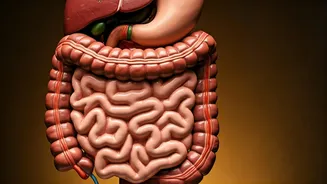Mindful Eating Practices
The first tip centers on mindful eating, a practice that encourages paying close attention to the entire eating experience. This includes being present
with each bite, savoring the flavors and textures of the food, and eating slowly. By slowing down, individuals are more likely to recognize their body's fullness cues, preventing overeating, which is a common cause of digestive issues. Mindful eating also involves being aware of the environment, such as minimizing distractions like television or phone usage during meals. Taking time to chew food properly enhances digestion by initiating the process in the mouth and allowing digestive enzymes to work efficiently. Overall, mindful eating cultivates a healthier relationship with food, leading to improved gut health and a more enjoyable Diwali celebration.
Hydration is Key
Staying adequately hydrated is essential for digestive health and is the second key tip. Drinking sufficient water throughout the day helps the digestive system function optimally. Water aids in breaking down food, facilitating nutrient absorption, and preventing constipation. It is crucial to increase water intake, particularly when consuming rich and spicy festive foods, which can sometimes lead to dehydration. Beyond plain water, including hydrating beverages like herbal teas or infused water can be beneficial. Avoid sugary drinks, as they can sometimes lead to digestive upset and can interfere with the benefits of proper hydration. Drinking water consistently throughout the day promotes overall well-being, supports effective digestion, and minimizes the risk of digestive issues, making it a crucial practice during Diwali.
Prioritize Fiber Intake
The third tip emphasizes the importance of incorporating fiber-rich foods into your Diwali diet. Fiber supports healthy digestion by promoting regular bowel movements and preventing constipation. Including foods like fruits, vegetables, and whole grains helps add bulk to the diet and feeds the good bacteria in the gut. While enjoying festive treats, make an effort to balance them with fiber-rich choices. For example, choose whole-grain options over refined carbohydrates whenever possible. Including salads, vegetable-based side dishes, and fresh fruits during and between meals will provide a source of fiber. This approach contributes to a balanced diet, supports gut health, and minimizes the likelihood of digestive discomfort, allowing for more enjoyment of the festivities.
Portion Control Strategies
Implementing portion control is the fourth tip and an essential aspect of maintaining gut health during Diwali. The abundance of delicious food during the festival can make it easy to overeat, placing extra strain on the digestive system. Practicing portion control involves using smaller plates, being mindful of serving sizes, and avoiding second helpings. Before reaching for another serving, pause and assess whether the body is genuinely hungry or just eating out of habit or social pressure. It is also beneficial to sample various foods in small amounts rather than loading up on one dish. By being mindful of the portions consumed, one can enjoy festive treats without experiencing digestive problems. This approach supports a balanced diet, minimizes digestive distress, and allows you to enjoy the Diwali celebrations without discomfort.
Probiotics & Prebiotics
The fifth tip focuses on the benefits of probiotics and prebiotics for gut health. Probiotics are live microorganisms that promote a healthy gut microbiome, and prebiotics are fibers that feed the beneficial bacteria in the gut. Incorporating probiotic-rich foods such as yogurt, kefir, or fermented vegetables can aid in balancing the gut flora, which can be disrupted by dietary changes during Diwali. Prebiotics are naturally found in foods like onions, garlic, and bananas. Including these foods in the diet can encourage the growth of beneficial bacteria, which contributes to improved digestion and immunity. Using probiotic supplements is another way to support gut health. By proactively supporting the gut microbiome, one can minimize digestive issues and enjoy a happier and healthier Diwali.
Herbal Tea for Relief
The sixth tip suggests incorporating herbal teas into the diet to aid digestion. Certain herbs are known for their digestive benefits and can provide relief from bloating, gas, and other digestive discomforts. Peppermint tea, for instance, can help relax the digestive muscles and ease bloating. Ginger tea has anti-inflammatory properties and can reduce nausea. Chamomile tea has soothing effects and may help relax the gut, easing discomfort. Drinking herbal tea after meals can also promote relaxation and facilitate digestion. By incorporating herbal teas into the Diwali routine, individuals can support their digestive health and alleviate potential discomfort caused by the festive eating habits. This can contribute to a more enjoyable and comfortable Diwali experience.
Stress Management Techniques
The final tip underscores the impact of stress on gut health and suggests incorporating stress management techniques during Diwali. Stress can significantly affect the digestive system, leading to issues like indigestion, bloating, and changes in bowel habits. Practicing stress-reducing activities can support gut health and overall well-being. These can include mindful breathing exercises, meditation, or spending time in nature. Gentle exercises like yoga can also help alleviate stress and promote digestive health. Making an effort to disconnect from electronic devices and engaging in relaxing activities can also reduce stress levels. By prioritizing stress management, one can foster a more balanced and relaxed environment, promoting improved digestion and allowing you to fully enjoy the celebrations without the added burden of stress.















